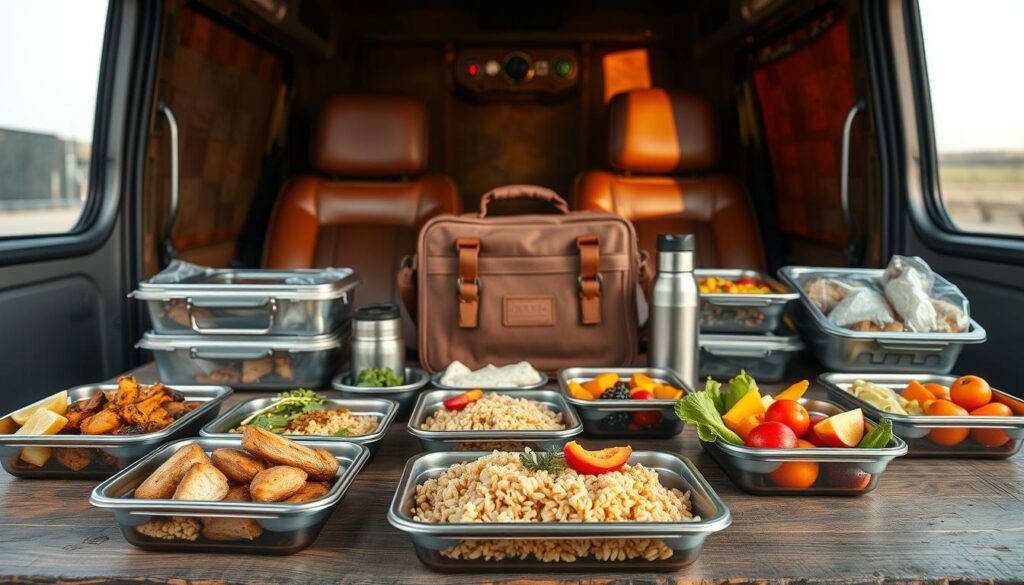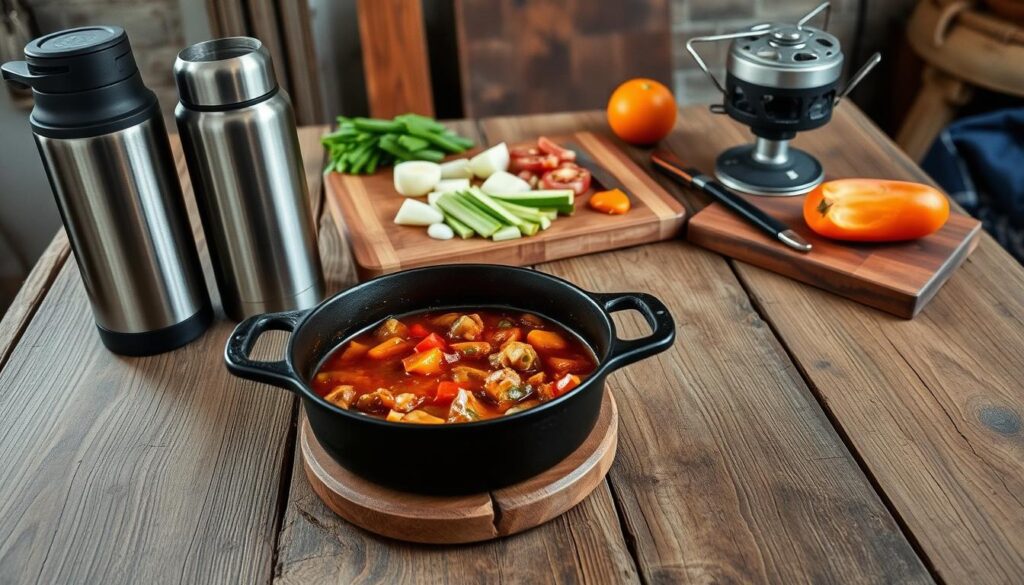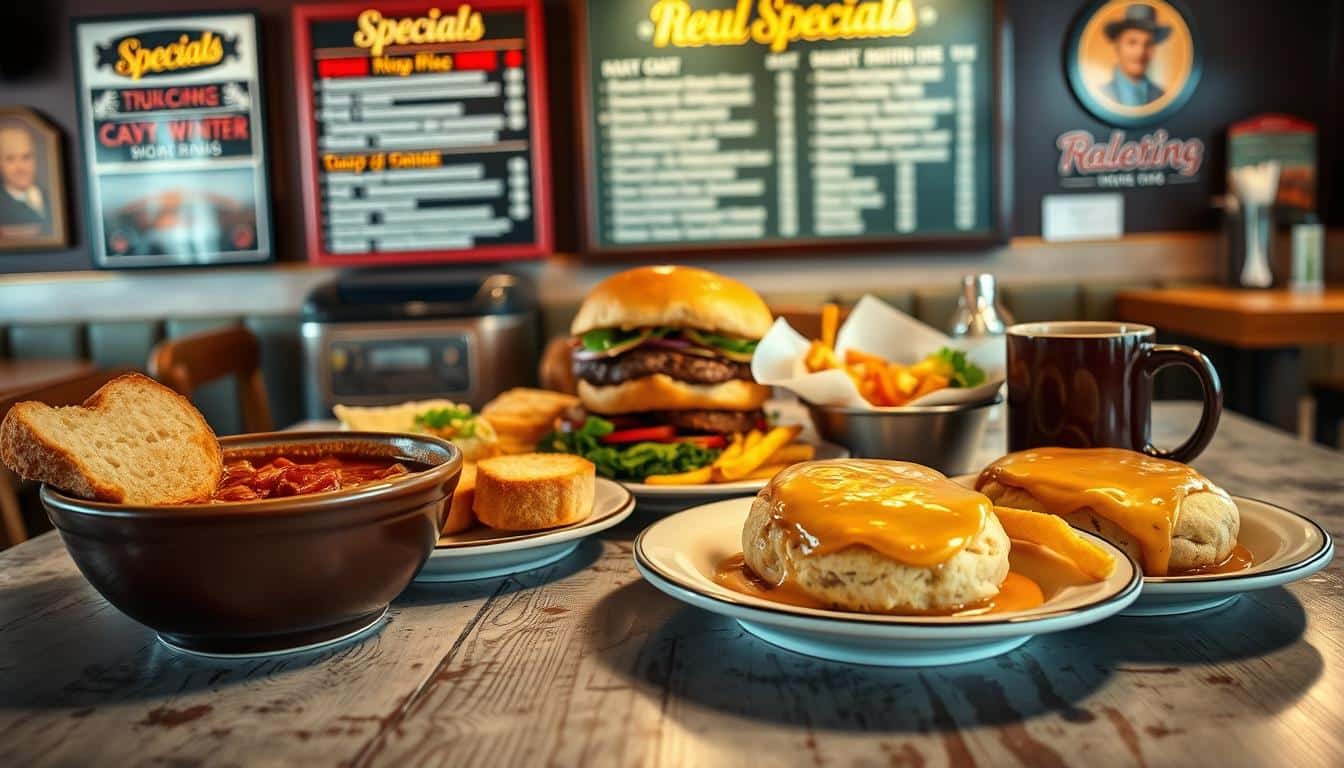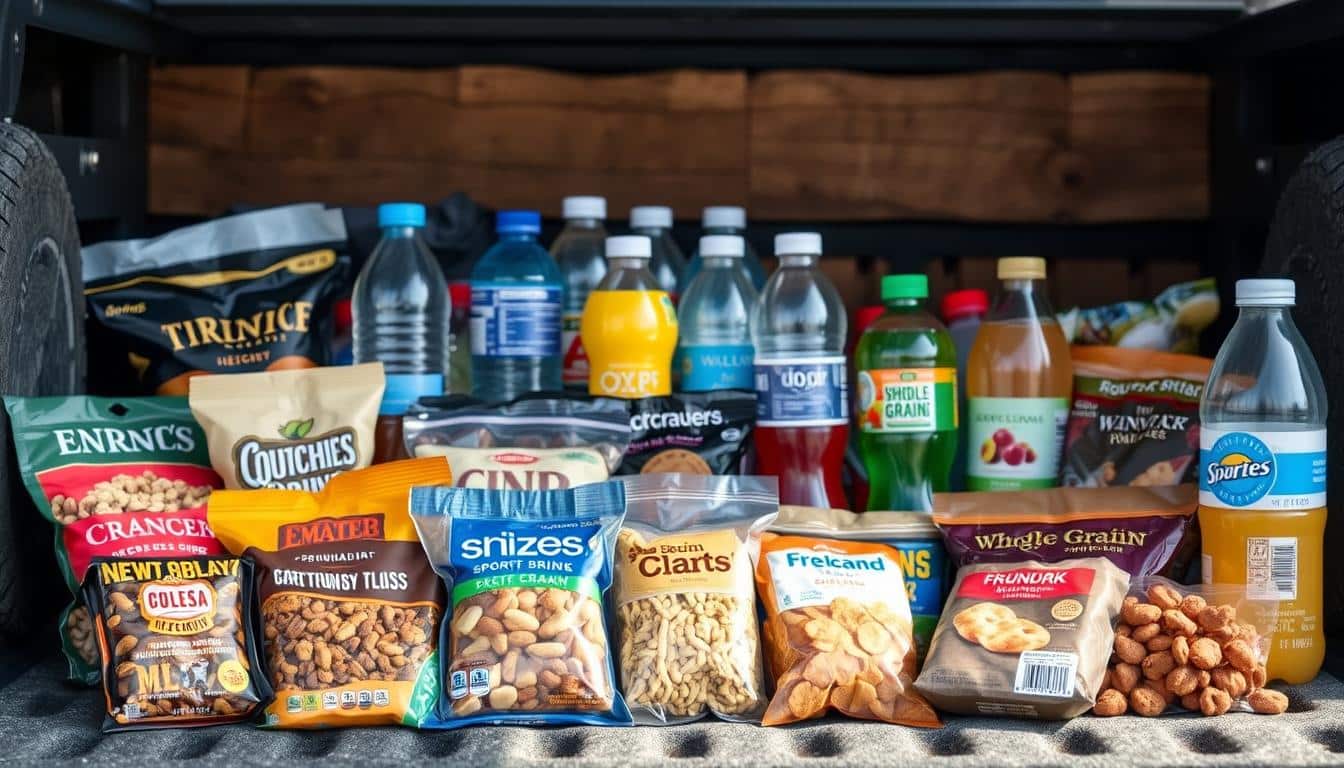Long trips don’t mean you’re stuck with greasy food or wasted time. This guide offers useful meal prep tips and easy recipes perfect for truckers. You’ll find straightforward, healthy meal ideas. They’ll help keep your energy high, costs low, and minimize your stops.
This article is all about helping truck drivers in the U.S. cook on the go. It talks about tools like portable coolers, 12-volt appliances, and thermoses. You’ll learn about quick and simple meals like overnight oats, jar salads, wraps, and slow-cooker stews. Plus, there’s even a recipe for air-fryer pizza. These meals are easy to take with you and safe to store.
The benefits include better health, less money spent on food, and staying on track with your schedule. The tips and recipes come from trucker wellness sources. They include advice from places like Overdrive Online and various carrier wellness programs. So, the information is based on what works for truckers on the road.
Keep reading to discover which tools to buy, how to shop smart, and easy-to-make recipes. These will make cooking on the road both possible and fun. It’s great for drivers looking for a healthier, cheaper way to eat while traveling.
Why Meal Prep Matters for Truck Drivers
Meal prep makes the truck a dependable place for food. It lets drivers pick healthy foods and save money. Packing a thermos or salads ahead of time helps make better food choices simple.
Health benefits of planning meals on the road
Planning meals cuts down on unhealthy fats, calories, and salt from truck stops. It allows drivers to eat more protein, fiber, and veggies. This keeps them energized and alert while driving.
Knowing your portions and meals helps drivers manage their weight better. It also means less junk food and avoiding late-night fast food.
Cost savings compared to eating out at truck stops
Cooking in the truck is cheaper than eating out. Buying basics like rice and batch-cooking meat saves money over time.
Saving on meals adds up quickly. Choosing to cook in the truck or pack meals saves even more money.
Time savings and reducing decision fatigue during long hauls
Ready-made or simple to reheat meals means fewer stops. Cooking in batches or preparing simple meals saves time for rest or more deliveries.
Making fewer choices on meals helps drivers stay sharp on the road. Starting with small steps, like prepping one meal, helps build a manageable routine.
Essential Gear for Road-Ready Cooking and Storage
The right gear is key for simple, fresh meals during long drives. Quality trucker cooking equipment enables healthy options, saves money, and time. Choose compact items that suit your cab and schedule.
Portable coolers, mini fridges, and in-truck refrigerators
A good portable cooler is vital for short trips. It keeps dairy, cooked meats, and produce safe. For longer journeys, a mini fridge or truck refrigerator means you can have fresh veggies and yogurt. Always have a thermometer in your cooler or fridge to monitor and prevent food from spoiling.
12-volt appliances: lunchbox cookers, slow cookers, and mini microwaves
With 12-volt appliances, hot meals are easy, no truck stop dining needed. A 12V slow cooker or powered lunchbox that connects to the cab outlet is handy. For greater cooking flexibility, consider compact mini microwaves and efficient units like low-power Instant Pots, if your truck’s power system supports them. Selecting the right appliances means you can enjoy warm, hearty meals anytime.
Reusable containers, thermoses, and portion-size bags for safe storage
Opt for microwave-safe containers and BPA-free tubs for easy reheating. Label your containers to keep track of dates and what’s inside. Thermoses and insulated jars are great for keeping soups warm. And use small bags or portion packs to control eating and have snacks ready.
Always carry a basic set of utensils, a small cutting board, a sharp knife, hand sanitizer, and wipes. Combining these with your meal storage choices and a trusty cooler makes cooking in your truck both doable and neat.
Smart Shopping and Budget-Friendly Ingredient Choices
Smart shopping is key to saving time and money. Create a basic list focused on versatile staples and long-lasting items. Making small changes in your shopping habits can ease meal prep on a budget and organize your space better.
Consider buying in bulk for items like rice, oats, pasta, and quinoa. They’re cheaper in large quantities. Whether you prefer dry or canned beans, bulk buying is beneficial. These staples are perfect for various meals, allowing you to enjoy different tastes without extra shopping trips.
- Choose multi-use staples for flexibility.
- Store bulk purchases in reusable containers to prevent food waste.
- Maintain a concise inventory list to know what you need.
Frozen veggies and proteins are great for truckers. Options like frozen broccoli, spinach, peas, and mix veggies keep well and reduce constant grocery visits. Frozen meats like chicken, turkey, and shrimp stay good longer and reduce the chance of spoilage.
Take advantage of sales when they occur. Align sales with your main ingredients and tweak your meal plans accordingly. Special deals can help you stock up on items that freeze well. This helps in planning meals within your budget and maximizing your spend.
- Look at weekly ads before shopping and focus on versatile sale items.
- Only buy in bulk if you have the space to store it properly.
- Replace brand-name snacks with homemade ones to save money.
To minimize food waste, be mindful of purchasing perishables. Prepare and label meal portions, freezing what you won’t soon use. Always move older items to the front to ensure they’re used first.
For cost-effective eating, rely on beans and homemade snacks. With just a few key items and a bit of planning, you can enjoy good meals on the road while keeping your budget in check.
Trucker Meal Prep
Begin with a simple meal prep plan that fits your schedule. Start by choosing either one meal or a week’s worth of breakfasts or lunches. Focus on easy recipes like overnight oats, hard-boiled eggs, or wraps. This will lower your stress and show that your plan works.

Batch cooking is a great time saver. Cook large portions of chicken, salmon, or grains like rice and quinoa. Then, use these prepared foods to make bowls, salads, and sandwiches. You won’t need to reheat anything.
-
For batch cooking: cook your proteins and grains once. Then just switch up the sauces and veggies for different tastes.
-
To keep things interesting, use the same cooked ingredients. Just add salsa, pesto, or a soy-ginger dressing for new flavors.
Keeping track of portions helps you manage both calories and expenses. Pre-pack meals into single servings. This makes grabbing a meal easy and prevents you from eating too much. It also simplifies keeping track of what you have.
-
Label your meals with what’s inside and when you made them. This helps you keep track and avoids confusion.
-
For keeping things cold: move packs from freezer to cooler. Also, use a thermometer to ensure everything stays below 40°F.
Choose containers that seal well and a lunchbox that insulates. Use labels and control your portions to minimize waste and ensure food safety on your trips.
First, start small. Then, increase your batch cooking over time. Use portion control and label your meals. This keeps you safe and brings variety to your road meals.
Easy Road-Ready Breakfast Recipes
Start your day strong with food that keeps you alert and satisfied. These breakfast ideas are perfect for truckers. They’re easy to make, store, and eat on the go. Just use a mini-fridge or cooler for freshness. And choose recipes that are good hot or cold.
Overnight oats variations for grab-and-go mornings
Overnight oats are a great choice. Mix rolled oats, milk or almond milk, yogurt, and chia seeds in jars. Then add your favorite fruits, nuts, or peanut butter. This way, you’ll have tasty and nutritious meals ready for several days.
- Classic: oats, Greek yogurt, honey, and sliced banana.
- Peanut butter & jelly: oats, milk, peanut butter, and frozen berries.
- Apple-cinnamon: oats, grated apple, cinnamon, and chopped walnuts.
Make-ahead egg bakes and hard-boiled eggs for sustained energy
Create a make-ahead egg bake with any leftover veggies, meats, and cheese you have. You can cook it in a dish or muffin tin for easy reheating later.
Hard-boiled eggs are another great choice. They don’t need heating up. Pack them with toast or a banana for a quick, filling snack.
- Veggie egg muffins: spinach, bell pepper, onion, and feta.
- Meat-lover’s bake: diced ham, green onion, cheddar, and egg.
- Simple boiled eggs: peel and store in a cooler for a week.
Breakfast burritos and portable protein-packed options
Make breakfast burritos with scrambled eggs, black beans, cheese, and peppers. Wrap them in foil and keep them chilled. Warm them up in a microwave, toaster oven, or cooker whenever you’re hungry.
Try other snacks like oat-and-nut muffins, energy bars, and fresh fruit for energy. These are great when you’re moving between stops.
- Freezable burritos: cook eggs, add beans and cheese, wrap, then freeze flat.
- Quick reheat tips: thaw overnight in the fridge or reheat from frozen for a few minutes at a time.
- Snack pairings: pair a burrito with yogurt or a small trail mix for balanced energy.
Lunch and Dinner Ideas That Travel Well
Packing satisfying meals makes trips easier and healthier. Use a cooler or mini-fridge to keep things fresh. Pick options that are good without reheating. Below, find road-tested ideas for tight schedules and simple gear.
Jar salads and protein bowls remain fresh when you layer them right. Start with dressing at the bottom, then add quinoa, roasted veggies, or beans. Finish with grilled chicken, hard cheeses, or avocado just before you eat. These meals are easy to carry and provide energy for the road.
Wraps and sandwiches are great for quick stops. Use sturdy tortillas or romaine leaves for wraps. Turkey wraps, chicken salad sandwiches, and lettuce wraps don’t need reheating. Add in cheese, avocado, or pickled veggies for taste and texture.
Slow cooker meals for truckers and one-pot dinners simplify cooking. Prepare chili, beef stew, or pork chops in a slow cooker before work. Keep them in thermoses to stay warm, or cool them down for reheating. These meals bring the comfort of home to your cab.
- Make-ahead protein bowls: quinoa, roasted sweet potato, black beans, and salsa.
- Sturdy wraps for travel: spinach tortilla, sliced turkey, Swiss, and hummus.
- One-pot options: chili, lentil stew, and easy curry for mini microwave reheating.
Try adding quesadillas, stir-fries with low-sodium soy sauce, or sushi-style wraps for variety. Change up your meals to avoid getting tired of the same foods. Keep your nutrition balanced. With some planning, you can turn a small cab space into a trusty kitchen on the go.
Simple Snack and Dessert Options for the Cab
Have snacks ready to stay energized and skip extra stops. Picking good snacks can make long drives nicer and help you avoid fast food.
Healthy snack packs are easy to make and carry. Try mixing nuts, seeds, and dried fruit for your own trail mix. Carrot and celery sticks go great with hummus. You can also bring string cheese and crackers, or turkey slices with almonds. These snacks are perfect for truckers and help maintain your energy on the road.
- Trail mix: almonds, cashews, pumpkin seeds, and dried cranberries.
- Veg sticks: carrots, celery, bell pepper strips with portioned hummus.
- Protein packs: turkey, cheese, and a handful of nuts.
Low-prep desserts are great for a light sweet fix. Frozen grapes are a cool, sweet snack. Look for fruit bars that use real fruit and less sugar. Include small treats like dark chocolate or Greek yogurt in your cooler. These desserts are tasty but lower in calories for the road.
- Frozen grapes for a sweet, crunchy snack.
- Fruit bars with real fruit and no artificial sweeteners.
- Small servings of popcorn or a single scoop of ice cream as an occasional treat.
Strategies to prevent mindless snacking really help on long trips. Pack snacks in small bags or containers to eat one serving at a time. Schedule snack and meal breaks to avoid eating out of boredom. Organize your cooler with labeled portions to choose healthy snacks without thinking too much.
- Portion before you leave: use 1-cup or single-serve bags.
- Schedule snack times: tie them to fuel or rest stops.
- Keep tempting extras out of sight to avoid impulse reaches.
Small changes in how you pack and plan snacks can make a big difference. This way, you’ll feel better, save money, and reduce tiredness on long drives.
Recipes You Can Make with Minimal Equipment
When your cab is the kitchen, pick recipes that need few tools but are still tasty. These easy recipes make cooking simple and cleaning easy. Just bring basics like tortillas, cheese, cooked chicken, potatoes, and salsa. You’ll be able to whip up meals in no time.

-
Air fryer pizza and quick quesadillas
With an air fryer or small toaster oven, whip up a personal pizza in just 8–10 minutes. Begin with ready-made crust or flatbread, add sauce, sprinkle cheese and top with chicken or veggies. Cook until it’s golden and bubbling. Quesadillas are even quicker. Just stuff a tortilla with cheese and other fillings, fold, and toast. Whether using an air fryer or skillet, these meals are fast and tidy.
-
Baked potatoes and skillet-grilled wraps
A toaster oven or microwave can quickly cook baked potatoes. Top them with bacon bits, Greek yogurt or sour cream, and cheese for a fulfilling meal. For tasty wraps, stuff them with protein and veggies. Then, crisp them on a skillet. This method heats the inside and crisps the outside perfectly.
-
Cold-assembly meals: wraps, protein packs, and quinoa salads
If you can’t cook, cold meals are the way to go. Use pre-cooked chicken, canned tuna, or hard-boiled eggs. Create a hearty salad by mixing quinoa with beans, peppers, and lemon-olive oil dressing. Protein packs with cheese, nuts, and fruit are also great. They don’t need reheating, making them super convenient.
Always have small spices and condiments to switch up the taste without extra gear. Choose recipes that are good reheated or cold. With a bit of planning, these simple recipes can transform limited space into delicious meals on the go.
Food Safety, Storage, and Reheating on the Road
It’s easy to keep food safe in a truck with a few steps. Use a reliable thermometer and an insulated cooler or mini-fridge. Make sure cold items stay under 40°F. Rotate frozen packs daily to maintain the cold.
Label and portion your food to reduce risks and waste. Write dates on cooked grains, proteins, and eggs. Cooked food can stay good for 3 to 4 days if refrigerated. For longer storage, freeze your food and thaw when needed. This helps you know how long food stays fresh in your storage.
Here’s how to keep meals safe on long trips:
- Store food in airtight containers to avoid contamination.
- Throw away food not kept cold for over two hours.
- Only heat food once to avoid spoilage.
Reheat food to a safe temperature of 165°F. Use a microwave, lunchbox cooker, or toaster oven. Always use microwave-safe containers. For soups and stews, use thermal bottles. This keeps food hot for hours, without needing to reheat it.
Choosing the right equipment is key. Pick 12-volt devices meant for food and make sure they stay hot or cold. Use coolers with replaceable ice for better cooling during long trips. Checking these devices often helps keep your food safe and fresh.
Here’s what to do every day:
- Check your cooler’s temperature in the morning.
- Put dated labels on each container.
- Heat food to 165°F or keep it hot in a thermos.
- Dispose of food that’s been left warm too long.
Following these suggestions will keep your food safe and delicious. Building good habits can save you money and make driving easier.
Conclusion
This summary gives truckers practical steps for better eating while driving. Preparing your meals helps with health, cuts costs, and saves time. Starting with something small like overnight oats, grilled chicken, or salads in a jar can really help.
Important tips for meals on the road include having things like a cooler, thermos, and a portable cooker. Cooking batches of proteins and grains is also a good idea. And don’t forget to use frozen foods, look for sales, and properly label your meals for easy eating.
Quick meals that don’t need much equipment are key, like air-fryer pizza or wraps. This keeps meals interesting without too much work.
To wrap up trucker meal advice, always think about keeping food at the right temperature and clearly label it. Planning your food purchases can also save you money and keep you healthy. Make meal prep part of your daily routine. Start simple and then try new recipes as you go.
FAQ
What are the main benefits of meal prepping while driving over the road?
What basic gear should I invest in to cook and store food safely in my cab?
How do I keep perishable foods safe in the cab?
What are easy, low-equipment breakfast ideas for truck drivers?
Which meals travel best in a cooler and require little reheating?
How can I save money while keeping meals varied on the road?
What are quick, truck-friendly dinner ideas that use minimal space and tools?
How should I portion and label meals for safe storage and easy use?
Can I rely on frozen vegetables and proteins for nutrition and convenience?
What snacks and desserts work well in the cab without much prep?
How do I start meal prepping without getting overwhelmed?
Are 12-volt appliances safe and worth the investment for long routes?
How long can common prepared foods stay safe in a cooler or mini-fridge?
What are quick reheating and hot-holding tips when a microwave isn’t available?
How can meal prepping help me stick to dietary goals on the road?
Content created with the help of Artificial Intelligence.



